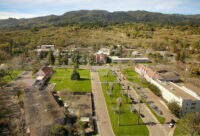
Ryan lely/Sonoma Valley Sun
Rancho de Sonoma co-owner Preston Cook says that his proposal to convert the mobile home park is a “win-win for everyone.” But many of the mobile home park’s residents oppose the plan.
A battle is in the works over a proposal to make condominiums out of Rancho de Sonoma, a 100-unit, age-55-and-over mobile home park off Highway 12, inside Sonoma city limits just south of the Maxwell Village Shopping Center.
Such proposals have caused controversy around Sonoma County, and this one is no exception. Many of the park’s residents are rallying against the plan, and the Sonoma City Council plans to consider the issue at its June 6 meeting.
Preston Cook, one of the park’s owners, called the proposed conversion a “win-win for everyone” and said it will give residents the chance to benefit from property ownership in desirable Sonoma County. No Rancho de Sonoma residents would be forced to buy the lot under their mobile home; they could continue to pay rent, which Cook said averages about $350 per month.
Cook promises that lifetime rent control will stay in place for low- and moderate-income residents – households of four that earn less than $90,100, annually. Monthly rent won’t go up more than $10 on an annual basis for these residents, he said.
“I’m trying to manage the controversy,” Cook said recently. “To me, there’s a right way of doing it, and that’s the way I’m doing it.”
Cook said that he wants to show other mobile home park owners “how to do it, and do it right and still make a profit.”
But despite Cook’s stated efforts to avoid controversy, it’s brewing. Park resident Diane Shepard said she’ll present a sheaf of petition signatures opposing the plan to the Sonoma City Council when it considers the Rancho de Sonoma condominium conversion on June 6.
“We have lots of residents in their 80s,” Shepard said. “They don’t want to take on a 30-year mortgage. “It’s probably not going to put these seniors who live here on the street, but it’s not a good deal, either.”
“I’m thinking about the next generation of senior citizens. Where are they going to live?” she asked. “There won’t be affordable housing in the city of Sonoma. There just won’t be.”
Uncertainties remain
Uncertainties about the conversion proposal concern Shepard, such as how much it would cost to buy a lot and what the condominium association fee would be. Shepard thinks that Rancho de Sonoma lots might cost between $100,000 and $150,000. Cook declined even to make a ballpark estimate of what the lots might cost before their value is assessed by a property appraiser as part of the conversion process.
Even seemingly small expenses, such as what Shepard said was the potential for the cost of cable TV increasing from its current $15 per month to $50, would be a hardship for low-income residents below the poverty level.
“A lot of these senior citizens don’t have anything else for entertainment,” she said. “People depend on cable. An extra $20, $30 … is a big deal.”
While Cook promises to keep rent control in place for low- and moderate-income residents, Shepard doesn’t like the fact that once those people moved out, the lots would go for market rates. Shepard said many of Rancho de Sonoma’s residents have annual incomes of less than $15,000. Once the lots are converted to condominiums, people in that income level couldn’t afford to buy.
“I’m talking about the next generation of senior citizens, where are they going to live?”
Cook is confident most residents will buy.
Cook let residents know of his proposal to convert the park into condominiums in late April. His attorney, L. Sue Loftin of Carlsbad, sent letters explaining the proposal and made a presentation to residents.
Cook and his two business partners bought Rancho de Sonoma in October 2006, for $6 million. They own another 129-unit park in the Bay Area and two in Oregon.
The business partners also own shopping malls. They want to sell off the mobile home parks, said Cook, because he’s the only one of the partners who handles that end of the business and he’s looking to do other things at this stage of life, including volunteer work and writing a book about bald eagles.
The conversion process begins with an application to the city for a subdivision map, according to information that Loftin’s firm presented to residents. The park owners also will submit a tenant impact report to the city.
While the city is involved in the conversion process, Cook said, “My understanding is that they can’t stop it.” That’s according to his attorney, he said. “She’s converted 83 of these parks into condominiums,” Cook said. “And she’s never lost once.”
City planner David Goodison thinks that the city could stop the conversion. And Shepard said that residents opposed to the conversion have hired an attorney to help them fight.
“They keep saying it’s a done deal. This is a great psychological ploy. The spin they put on this, they could work at the Bush White House.” Shepard said “We’re going to put up a good fight.”
Cook said he’s caught flak before, including during a stint as president of the Housing Authority of San Francisco.
“I (believe) most people will want to buy,” he said, adding that statistically, 70 percent of residents typically opt in for a condominium conversion.
“It’s a good deal. It really is,” he said.




